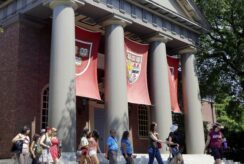The State Department says it could take up to eight weeks to process passport applications that have piled up during consular closings caused by the coronavirus.



By Lara Jakes and Tacey Rychter
WASHINGTON — Sarah Farris, an American living in Singapore, rushed to her parents’ home in Florida in April to see her father before he died. She is now stuck, unable to return to her job, because she has been unable to renew her expiring passport.
In Switzerland, Leslie Hansen has been waiting since mid-March to renew her U.S. passport, which expired in May. Without it, she has no valid travel document and only a nondescript letter from the American Embassy in Bern to prove her citizenship.
Even U.S. government employees are among what officials described on Friday as a backlog of 1.7 million Americans waiting for passports after the State Department shut down most of its consular services to protect its staff from contracting the coronavirus.
Jason Talley, who works for the Federal Emergency Management Agency, has been waiting since March to apply for passports for his family to go on a $12,000 family vacation this summer to Europe that he booked in January.
“That’s the pit in my stomach, where I’m like, all that money’s gone,” said Mr. Talley, who lives in Fredericksburg, Va., and saved for nearly seven years to afford the vacation. He cannot fly without the passports, and the cost of his foreign airfares and other bookings are unlikely to be refunded.
This week, the State Department reopened 11 passport agencies across the United States, in the hopes of processing about 200,000 applications each week, going back to February. But officials predicted it would still take up to eight weeks — before even starting on new applications — to cut through the backlog as consular employees return in phases after months of working from home.
Over the last three months, officials have expedited passport applications only for what Carl C. Risch, the department’s assistant secretary for consular affairs, described on Friday as life-or-death situations.
Passport services in American embassies and consulates abroad also have been suspended for all but urgent cases, and will reopen only after health conditions in each host country have been deemed safe for U.S. diplomats to return to work.
As many as two million Americans are overseas at any one time. The State Department processes about 18 million passports annually.
“We are aggressively increasing our processing capability, and doing everything we can do return to normal as quickly as possible,” Mr. Risch told reporters on a conference call.
He cited a “tremendously unpredictable environment” and said officials were trying to plan a better process if consular services were similarly shuttered in the future.
The delicate balance of how to provide U.S. citizens with passports while safeguarding employees who process them has confounded State Department officials during a pandemic that has all but paralyzed most routine consular services.
The dilemma has been amplified by President Trump’s demand to “REOPEN OUR COUNTRY,” as he wrote on Twitter last month, and pressure on everything from churches to restaurants to restart serving Americans.
Ms. Farris, a guidance counselor at an American school in Singapore, said State Department consular officers had told her that she might not receive her new passport until September. Her requests to have it expedited so that she can return to her job have been denied.
“The grocery store is open. People are delivering the mail,” Ms. Farris said this week in an interview. “You put on a mask and you do social distancing. This seems like an essential service.”
Far more than a travel document, passports are necessary to Americans abroad to prove citizenship when foreign authorities demand identification for a range of legal issues, including immigration and residency. They also serve as a powerful badge of protection for Americans under threat and are meant to assure embassy representation when it is needed.
Given the access that American passports provide, and to guard against counterfeiting and stolen identities, the documents generally are processed in secure facilities in the United States.
In a letter last week, seven Republican senators urged Secretary of State Mike Pompeo to find a resolution since the department “has not taken steps to innovate or adapt to a remote working process for this particular function.”The Coronavirus Outbreak ›
Senator James Lankford, Republican of Oklahoma, said the process “needs to be fixed long term.”
“Once flights reopen, once cross-border traffic reopens, we don’t need to have the government be the reason that they can’t actually move,” he said in an interview.
The delay may have a silver lining for businesses in the United States, however, as virus-wary Americans who do not have valid passports opt for domestic travel instead of going overseas.
Adam Sacks, the president of Tourism Economics, said that Americans were projected to spend $139 billion abroad this year. That money, he said, could be pumped back into the American economy and help offset financial losses from international travelers who spent $154 billion in the United States last year but are not expected to visit during the pandemic.
Mr. Risch said about half of the employees who process passports had returned to consular offices this week, and an additional 150 workers from other parts of the State Department were being pulled in to help. They will all be given personal protective equipment — like face masks and gloves — and will keep safe distances from one another.
Mr. Risch said passport applications would be considered on a “first in, first out” basis that would prioritize people who have been waiting since February.
In the past, consular officers have taken pains to try to sort out priority cases among applicants. That may still be quietly happening, at least to some extent.
“I am positive that they are on it to the extent that it is possible to be on it,” said Michele Thoren Bond, who was an assistant secretary for consular affairs during the Obama administration.
She said consular officers were well aware that Americans who are stuck have no other way to get passports.
Ms. Hansen, who has lived in Switzerland for the last 20 years, said American diplomats there appeared to share her frustration in being unable to renew her passport after she first tried to schedule an appointment to do so in February.
“I almost feel stateless,” she said in an interview on Friday. “I’m not in my own country and I don’t have my passport.”
Lara Jakes reported from Washington, and Tacey Rychter from New York.The State Department Amid a PandemicAs Pandemic Grows, U.S. Warns Americans Not to Travel AbroadMarch 19, 2020Stranded Abroad, Americans Ask: Why Weren’t We Warned Sooner?April 3, 2020At Least 13,500 Americans Abroad Need Help Getting Home, State Dept. SaysMarch 23, 2020
Lara Jakes is a diplomatic correspondent based in the Washington bureau of The New York Times. Over the past two decades, Ms. Jakes has reported and edited from more than 40 countries and covered war and sectarian fighting in Iraq, Afghanistan, Israel, the West Bank and Northern Ireland. @jakesNYT
Tacey Rychter is the social editor for the Travel section. @taceyrychter





